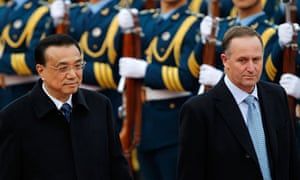Australian anxiety over China's South Pacific aid efforts is misplaced

Australia has become accustomed to dominating the development agenda in theSouth Pacific, setting priorities and determining the best policy responses. But Australia, like other traditional donors in the region, faces growing competition that is causing it to rethink how it delivers its aid in the region.
As in other parts of the world, the South Pacific is being courted by a diverse mix of new and returning donors, such as India, Russia, the United Arab Emirates and Israel. But the big new player – and the one causing the most angst to Australia – isChina.
Between 2006 and 2011, China provided US$850m in bilateral aid to the eight countries in the South Pacific with which it has diplomatic relations. Chinese aid is visible, and highly valued for its responsiveness, flexibility, and focus on priority projects and sectors.
China's emergence as a donor is also being exploited by Pacific leaders who are becoming more vocal about their relationships with the country and hinting that Australia is perhaps no longer the partner of choice. They also trumpet China's generosity to try to squeeze more financial support or more flexibility from traditional partners.
But concerns about China need to be put into perspective. Australia is the region's core security provider, and its largest source of aid, trade, and investment – and it will remain so for decades to come. In fact, there is no other region in the world where a single donor dominates to the extent that Australia does in the Pacific.
Australia provides 62% of total bilateral aid from Development Assistance Committee donors to the region, representing 37% of its total aid budget (2009-2011). As my Lowy Institute colleagueJenny Hayward Jones has noted, such dominance in percentage terms exceeds even that of the US in the Middle East, where America provides 51% of the total bilateral ODA received.
For Australia, China's development assistance should be viewed not as a threat, but as an opportunity. Australia's dominance in the region means it is in a strong position to work with China, for the sake of good development outcomes and to strengthen its bilateral relationship with Asia's rising power.
First and foremost, working with China will assist Pacific Island countries to maximise the development impact of Chinese assistance. Despite the genuine appeal of China's south-south co-operation approach, there are also a number of elements of Chinese aid that remain problematic. Aid is sometimes given to vanity infrastructure projects with no real development value. In other cases, Chinese soft loans are raising levels of indebtedness. And the inexperience of Chinese companies working in the Pacific Islands context sometimes adds to social tensions.
China has indicated that it is willing to engage in a collaborative approach to development in the region. The South Pacific boasts the world's first trilateral project involving China and a traditional donor – the jointly funded water improvement project between New Zealand and China in the Cooks Islands. The April 2013 Australia China development co-operation partnership memorandum of understanding (MOU) provides an important signal about collaboration with Australia. The MOU has resulted in Australian and Chinese experience-sharing activities in Papua New Guinea to fight malaria.
Australia's might in the region puts it in pole position to work with Asia's rising power for the sake of good development results
This co-operation also offers value in terms of the Australia-China bilateral relationship. Unlike in other parts of the world where China has complicated relationships with regional powers, the Pacific Islands offers a low-risk, relatively straightforward case for co-operation. Australia and China have a healthy but largely transactional relationship focused on trade, so collaborating in a region where they share common interests could add real substance to bilateral ties between the two countries.
Australia's dominance of the South Pacific region may be challenged by China, but it is not going to be overtaken by it. And in an era when almost everything China does on the world stage is viewed with some suspicion, there is an opportunity to build constructive co-operation with the Chinese that will serve everyone's interests, including those of developing countries in the region.
No comments:
Post a Comment
Comments always welcome!